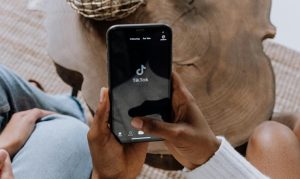 By: Gabriel Barajas, Staff Writer.
By: Gabriel Barajas, Staff Writer.
After a turbulent month of legal battles and political scrutiny, TikTok is once again available for download in the United States. The widely popular short-form video app, owned by Chinese tech giant ByteDance, was pulled from the Apple App Store and Google Play Store on January 19 due to mounting national security concerns. Now, a temporary reprieve has allowed its return—but its future remains uncertain.
TikTok’s removal was the result of heightened concerns among U.S. lawmakers over the app’s data privacy policies and potential ties to the Chinese government. Officials in Washington have long feared that ByteDance could be compelled to share American user data with Beijing, an allegation the company has repeatedly denied.
The ban, initially upheld by the Supreme Court on January 17, forced Apple and Google to comply or face financial penalties. The move ignited widespread debate, with digital rights advocates arguing that the decision infringed on free speech, while national security experts maintained that it was a necessary precaution against foreign surveillance.
On January 20, President Donald Trump signed an executive order delaying the enforcement of the ban for 75 days, allowing ByteDance more time to negotiate a sale of TikTok’s U.S. operations. However, app store providers remained hesitant to reinstate the app until a formal clarification arrived. That clarification came on February 13, when U.S. Attorney General Pam Bondi assured Apple and Google that the ban would not be immediately enforced. This paved the way for TikTok’s return, along with other ByteDance-owned apps such as CapCut and Lemon8.
Despite the temporary green light, the app’s long-term status is still in flux. If ByteDance fails to divest its U.S. operations within the extended timeframe, another ban may be imposed, leaving American TikTok users in limbo once again.
As TikTok fights to remain in the U.S. market, multiple parties have expressed interest in acquiring its operations. Former Los Angeles Dodgers owner Frank McCourt, in partnership with Reddit co-founder Alexis Ohanian, has launched a bid to buy TikTok’s U.S. business. Their proposal aims to restructure the platform using blockchain technology to ensure greater user data protection and transparency.
Other major tech companies, including Oracle and Microsoft, have also been rumored to be exploring potential deals. However, any sale would require approval from both the U.S. and Chinese governments, a process that could prove complicated given the ongoing geopolitical tensions between the two nations.
 The debate surrounding TikTok’s presence in the U.S. is far from over. Critics continue to warn that the app’s Chinese ownership poses a security threat, with some lawmakers calling for a complete ban rather than a forced sale. Senator Tom Cotton, a vocal opponent of TikTok, has reiterated concerns about the app’s potential use as a surveillance tool, arguing that the Chinese Communist Party could exploit it for propaganda or data collection.
The debate surrounding TikTok’s presence in the U.S. is far from over. Critics continue to warn that the app’s Chinese ownership poses a security threat, with some lawmakers calling for a complete ban rather than a forced sale. Senator Tom Cotton, a vocal opponent of TikTok, has reiterated concerns about the app’s potential use as a surveillance tool, arguing that the Chinese Communist Party could exploit it for propaganda or data collection.
ByteDance has repeatedly denied these claims, insisting that American user data is stored securely in the U.S. and managed independently from its China-based operations. The company has also ramped up lobbying efforts, engaging with lawmakers and regulators to prevent further action against the app.
For now, TikTok users in the U.S. can continue using the app without restrictions, but uncertainty looms over its long-term availability. The 75-day deadline set by the Trump administration will expire in early April, and if no sale or alternative agreement is reached, the ban could be reinstated.
Meanwhile, competitors such as Instagram Reels, YouTube Shorts, and X (formerly Twitter) are positioning themselves to capture TikTok’s audience should the app face another removal. As the situation unfolds, content creators, advertisers, and users alike will be watching closely to see whether TikTok can secure a permanent foothold in the U.S. digital landscape.
With legal battles, political maneuvering, and corporate negotiations still ongoing, the future of TikTok in the United States remains a high-stakes issue that is far from resolved.


